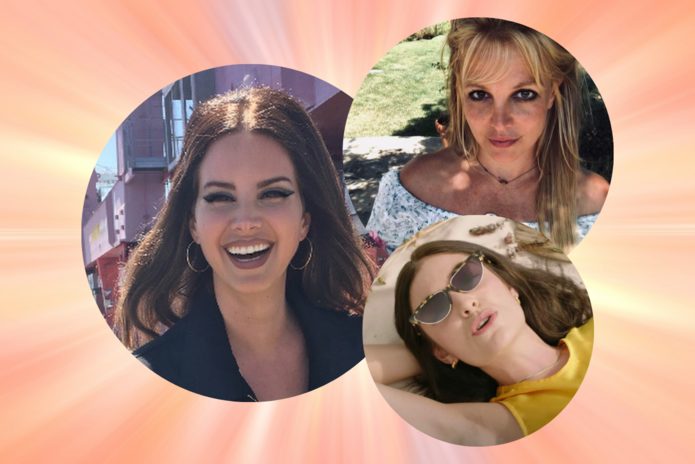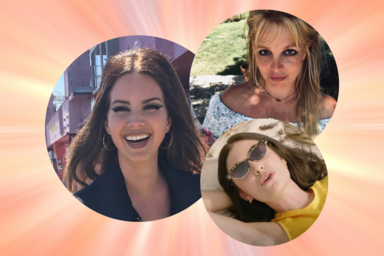Edited by: Rishika Agarwal
Used to burn CDs full of songs I didn’t know
Used to sit in my bedroom, puttin’ polish on my toes
Recently, I’ve been thinkin’ ’bout a way simpler time
Sometimes I really think it would be cool to rewind
– Rewind by Charli XCX
I deserve my own consideration
Sometimes I wish I kept
Some of my feelings in the basement
So I’d still have some left
– Tornado Warnings by Sabrina Carpenter
The era of the indie sleaze was characterized by smudged eyeliner, messy hair, and infinite moments of chaos, but the most distinctive aspect of the indie sleaze era was undoubtedly the grimey, pulsating and carefree indie sleaze music. The “party chic” era consisted mostly of indie rock bands, including The Strokes, The Libertines, Interpol, Daft Punk, Arctic Monkeys, and more. Transitioning from this iconic period and sharing some of its musical roots with the indie rock music scene is the legendary pop music paradigm. Pop music is a blend of varying genres like jazz, punk, country, classic rock, blues and many more alike. The popularity of this genre relies mostly on the kind of music that appeals to the vast majority of people and with the advent of platforms like TikTok, the admiration for a newly-released album and its success is often determined by the amount of hype and fan-following it receives on TikTok and other social media platforms.
While the widespread popularity of popular music has always been a matter of heightened interest for music enthusiasts, record-labels, and Billboard charts, what is often obscured and overshadowed by all this fast-paced recognition is the artist’s motivation and drive that compels them to channel their emotions into creative endeavors and personal art, in this case their music. The best songs are always the ones that are inspired by real-life experiences which add an additional layer of depth and complexity to the music. Paul McCartney once said, “But with writers, there’s nothing wrong with melancholy. It’s an important color in writing.” One of the pivotal reasons we listen to the artists we love is that hearing them sing about their emotional experiences in life, irrespective of whether joyous or painful, helps us to relate to them. The authenticity of their music acts as a catalyst that triggers the senses of the general public, and in turn, the audience resonates with the lyrics that remain etched in their hearts for time immemorial. Storytelling is key to winning the hearts of the masses, the personal narratives are shaped by life experiences and everyday conversations that tell a story to the audience, coupled with the genius lyricism of the musicians.
Introspection is a mixtape of songs that has the impeccable ability to teleport people back in time. The famous (or infamous) heartbreak songs that dominate the pop music industry today and stir up drama also have a massive impact on listeners, especially teenagers and adolescents. There’s nothing like having your favorite artist narrate the gut-wrenching story about a past breakup which can be synonymous with the listener’s own experience. Such points of similarity can be liberating and cathartic for both the artist and the listener as they navigate tumultuous times together. The shift in the pop music genre from the typical cheerful and bubbly vibe to a much more realistic, radical and revolutionarily modern take has been refreshing and has enhanced the quality of songs produced by the industry over the past few years. Well-known pop anthems like Billie Eilish’s When the Party’s Over, Summertime Sadness by Lana Del Rey, Slow Dancing in the Dark by JOJI and Liability by Lorde define a generation of music that is soulful, deeply introspective and intellectually-stimulating. With the advent of minimalist pop music such as Charli XCX’s sixth album, BRAT and over-the-top and extravagant catchy tunes of Sabrina Carpenter’s latest hits, Espresso and Please, Please, Please, all signal the rise of a new and exciting era in the long trajectory of pop music.
Despite being an industry that heavily relies on and can sometimes be driven by commercial success in a capitalistic music market setup– rather than the genuine appreciation of the art and aesthetics, pop music is still largely relevant and will continue to be all-pervasive in the future because of its element of emotional resonance, merged with appealing visual aesthetics and the widespread adoration for pop music among people. The pop music industry is here to stay because it has evolved in numerous ways, starting from niche art-pop and experimental psychedelic rock to more recent sub-genres like electro-pop and alternative rock. Regardless of the categorization, the pop music scene is one that is near and dear to the lives of millions of people who love, admire, and cherish the melodies and rhythms that will forever be remembered and passed on.


